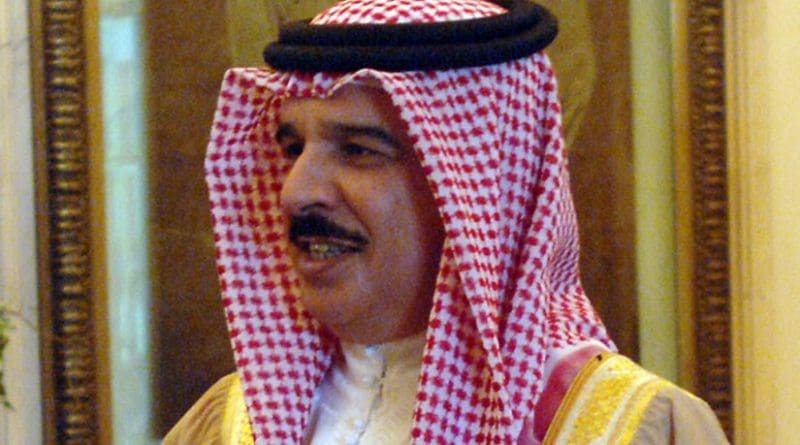Iranian Meddling In Bahrain: No Longer In Denial? – OpEd
By Arab News
By Baria Alamuddin*
In the years after 2011, I grew accustomed to receiving a condescending grimace from Western officials when I asked about Iranian terrorism in Bahrain. Often this would earn me a lecture about “prisoners of conscience” and “rights to peaceful protest.”
Despite Bahraini authorities’ efforts to reach a consensus with opposition entities via dialogue, reforms and permitting licensed protests, there was a stiff refusal to countenance Iranian meddling in the Gulf, and to recognize the militant and sectarian ideology of these Tehran-backed groups.
Today, not only has the mountain of evidence become incontrovertible, but the Trump administration has loudly denounced terrorist entities pursuing Iran’s agenda in Bahrain. British leaders have been quick to parrot these denunciations. Suddenly everybody wants to talk about Iranian interference.
The spotlight has fallen on a previously unknown figure, Murtaza Al-Sanadi, who fled to Iran in 2012. Al-Sanadi is the effective leader of the terrorist group Al-Ashtar Brigades, responsible for a string of killings of policemen in Bahrain. Al-Sanadi recruited hundreds of impressionable young men, many radicalized while on pilgrimage or religious study.
Along with training by the Revolutionary Guard in Iran, numerous militants traveled to Iraq for training with the Hezbollah Brigades, an Iranian proxy fighting as part of Al-Hashd Al-Shaabi that is complicit in war crimes, including sectarian cleansing and mass summary executions.
As dangerous as learning to build bombs is the poisoning of minds against Arab heritage and nationalism. Differences in religious belief between Shiites and Sunnis are tiny, yet these radicals are brainwashed into a culture of anti-Arab sectarian hatred.
Western misconceptions on this issue are rooted in the post-9/11 belief that terrorism is a Sunni phenomenon. But while Daesh tends to flaunt its violent acts, Iranian proxies in Iraq, Syria and elsewhere have been more discreet about the trail of blood they leave behind.
It has been relatively easy for Bahraini militants to join bus-loads of pilgrims visiting Iraq and obtain training from the Hezbollah Brigades. Some even temporarily signed up to Al-Hashd Al-Shaabi. An Ahrar Manama division of Bahraini fighters was reported earlier this year.
Pakistan’s leaders recently protested Iran’s policy of recruiting and radicalizing Pakistani and Afghan nationals for cannon-fodder in the Syria conflict. During the 1980s Iran-Iraq war, Iran used a similar tactic of battle-hardening Gulf militants on the frontlines, before sending them home to wage war.
A number of prominent Bahraini militants even lost their lives in this fighting. This militarization of Bahraini radicals culminated in a 1981 coup attempt by an Iranian proxy, the Islamic Front for the Liberation of Bahrain.
More than 35 years later, Iran’s strategy toward Bahrain and other Arab states has become more malign and expansive. As Quds Force Commander Qassim Soleimani reiterated and boasted in 2015: “We are witnessing the export of the Islamic Revolution throughout the region, from Bahrain and Iraq to Syria, Yemen and North Africa.”
The Hezbollah Brigades was also recently in the news as it sought to take receipt of half a billion dollars in ransom for 24 Qatari hostages it kidnapped in 2015 — the largest ransom in history. Although this money (for now) has been impounded on the orders of Iraqi Prime Minister Haider Al-Abadi, the dangers of handing over such a huge sum to terrorists and war criminals are only too obvious.
Given the Hezbollah Brigades’ support for Bahraini militants, this ransom money is in effect enabling terrorists to commit mass murder in a fellow Gulf Cooperation Council (GCC) nation, not to mention encouraging hostage-takers to strike again against high-value regional targets.
Among the other catastrophic consequences of this hostage deal are Syrian population swaps. In 2016, it became widely known that Iranian proxies were lobbying hard for a deal that removed Sunnis from the towns of Madaya and Zabadani, between Damascus and the Lebanese border.
Demographic engineering and sectarian cleansing are war crimes. Parties enabling such measures should be conscious of their obligations and the consequences under international law.
Tehran’s motivations are clear: Controlling weapons convoys to Hezbollah and a contiguous territory reaching the Mediterranean. I speak to Syrians who exclaim that Iran is creating “a hundred Palestines.” Does anyone believe that Syrians will simply walk away from land that has been theirs for hundreds of years?
Al-Sanadi, using Iranian media outlets to incite “holy war,” is one of many Arabs who have sold out their nations. The US designation of him as a “global terrorist” is belated recognition that when Iranian leaders threaten that the US Fifth Fleet could be “raised to the ground,” they are not joking.
A Washington Post report cites the seizure in Bahrain of “armor-piercing projectiles capable of slicing through a tank,” C4 explosive “in quantities that could sink a battleship… that almost certainly originated in Iran.” Militants were building sophisticated explosively formed projectiles (EFPs), devices last seen being used by the Hezbollah Brigades against US troops in Iraq.
In American politics, we are accustomed to policy U-turns every four to eight years, or in Donald Trump’s case from one day to the next. This makes the West ill-equipped to grapple with an Iranian strategy for regional dominance with the patience and tenacity to remain consistent over many decades.
The West may no longer be in denial about Iran’s meddling, but we seem little closer to a coherent strategy for halting its regional stranglehold by dismantling proxy militias and terrorist cells wreaking havoc across the Arab world.
*Baria Alamuddin is an award-winning journalist and broadcaster in the Middle East and the UK. She is editor of the Media Services Syndicate, a foreign editor at Al-Hayat, and has interviewed numerous heads of state.

